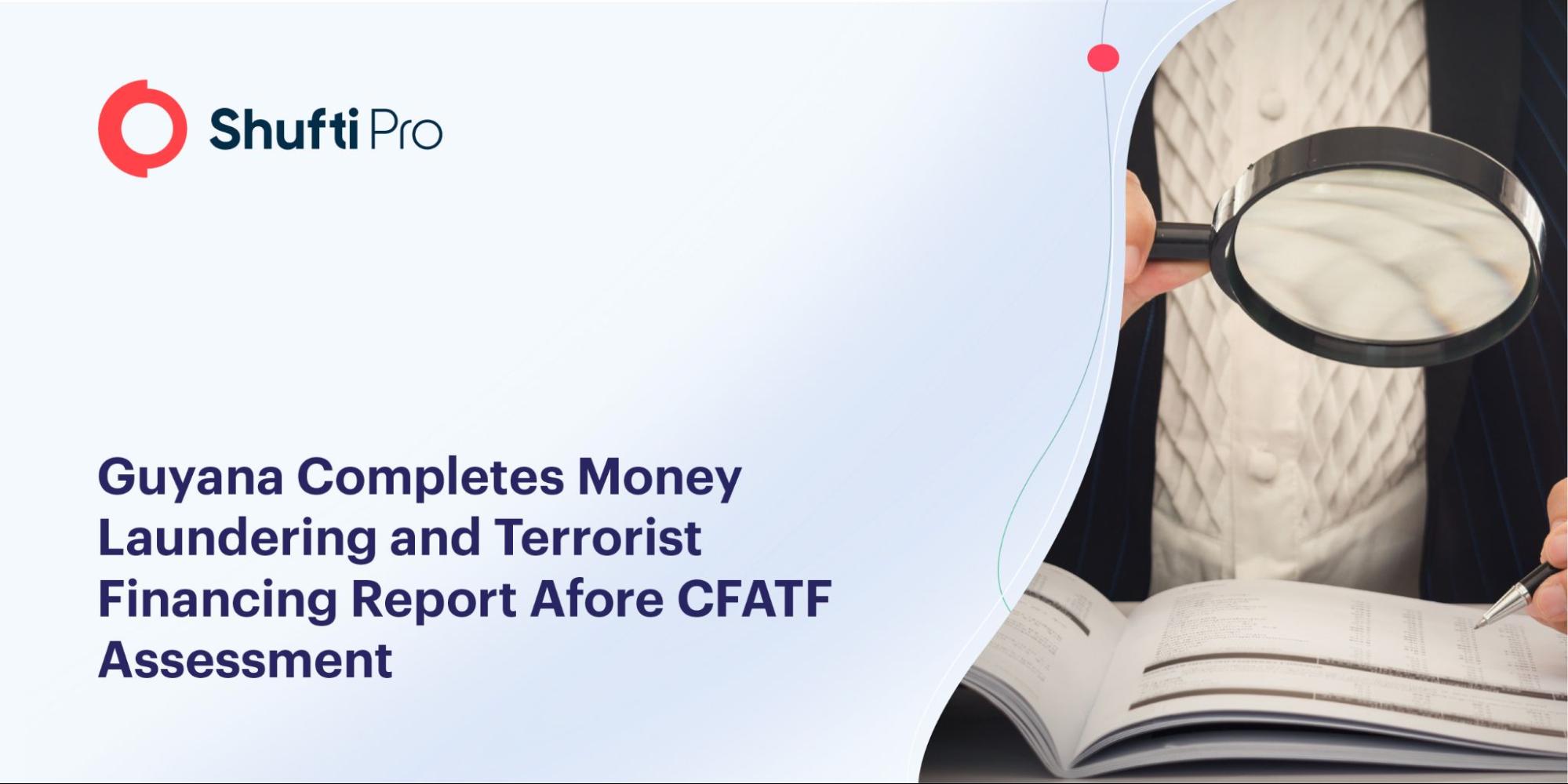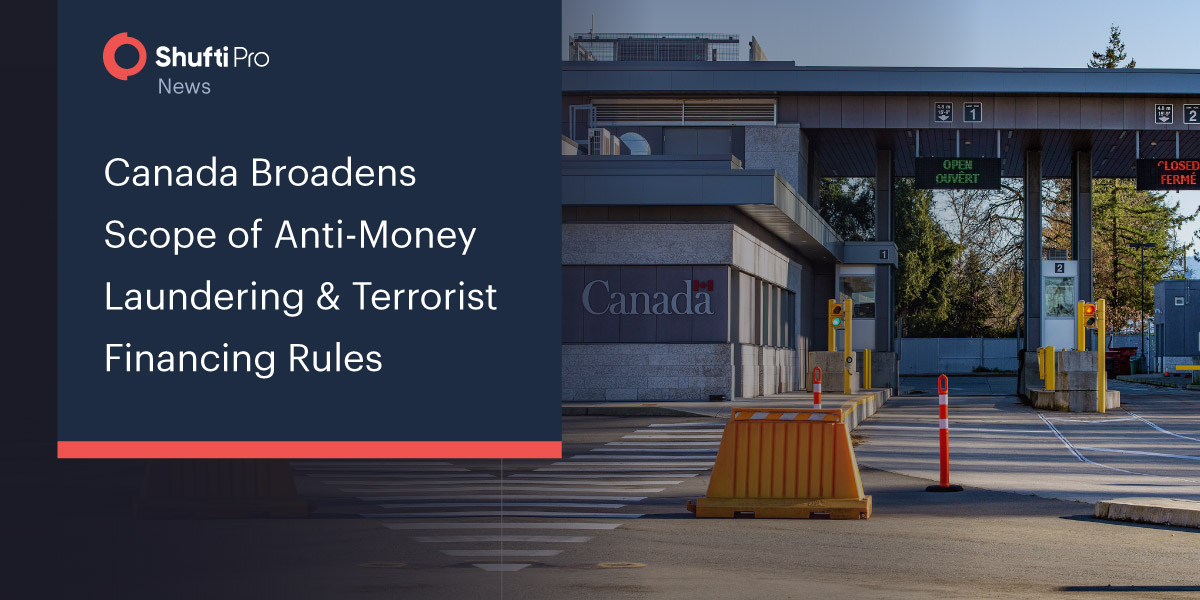News
US Officials allege student defrauded Apple as part of SIM swap attack
Richard Yuan Li, a student at the University of California-San Diego, is charged with plotting to...
 Explore More
Explore More
News
Police busted a massive £215m money laundering ring in the Northern Ireland
PSNI police arrested 7 individuals following one of the biggest money-laundering investigations i...
 Explore More
Explore More
News
UAE Struggles to Shade Off Grey-List Status as it Continues to Attract More Crypto Firms
The UAE is keen on regaining a good reputation by clearing its name from FATF’s grey list while t...
 Explore More
Explore More
News
AML Task Force Samlit Reports Success in Keeping Fraudsters at Bay
SA Anti-Money Laundering Integrated Task Force (Samlit) claims that it is competent in combating ...
 Explore More
Explore More
News
Manitoba Expands Criminal Property Forfeiture Branch to Counter Money Laundering
The Manitoba government is expanding the Criminal Property Forfeiture (CPF) branch as part of its...
 Explore More
Explore More
News
DFSA and Financial Intelligence Collaborate to Combat Financial Crime in UAE
Memorandum of Understanding (MoU) between the Dubai Financial Services Authority (DFSA) and the F...
 Explore More
Explore More
News
OCC, FDIC, & Fed Warn Banks of Significant Risks in the Crypto Industry
Three US banking regulators, the Federal Reserve (Fed), Office of the Comptroller of the Currency...
 Explore More
Explore More
News
Crypto Exchange Binance Banned by UK’s Financial Watchdog
Britain’s financial regulator, the FCA (Financial Conduct Authority) has said that Binance is no ...
 Explore More
Explore More
News
Zipmex Crypto Trading Platform Suspends All Activities in Thailand
Zipmex cryptocurrency exchange firm withdrew all activities in Thailand until 31st January 2024 t...
 Explore More
Explore More
News
Cybercriminals Targeting Bitcoin ATMs to Launder Money – Says FBI
The Federal Investigation Bureau (FBI) revealed gaps in financial regulations as money laundering...
 Explore More
Explore More
News
Cyberhack Discloses Data on Over 600,000 Medicare Beneficiaries
A data breach in May 2023 exposed the personal information of 612,000 Medicare beneficiaries, inc...
 Explore More
Explore More
News
UK has Suffered Fraud and Cyber Crime Losses Worth £1.3 Billion in 2021
London incurred the highest amount of losses to cybercrime and fraud in the first half of 2021, a...
 Explore More
Explore More
News
Taiwan Bans Four Foreign Banks for Breaching FX Regulations
The Central Bank of Taiwan has penalized four foreign banks for assisting 8 major grain companies...
 Explore More
Explore More
News
Taiwan FSC Fines Taishin Int’l Bank For Inadequate Internal Controls
Taishin Commercial Bank of Taiwan penalised for defrauding NT $347 million from customers and fai...
 Explore More
Explore More
News
The market for Digital Identity Solutions expected to double by 2024
The market for Digital Identity Solutions is predicted to double between 2019 and 2024, as report...
 Explore More
Explore More
News
Despite KYC, Dutch Central Bank Struggles over Crypto Ownership Records
Despite the strict measures for KYC requirements, the Central Bank of the Netherlands is still mu...
 Explore More
Explore More
News
NAB and CBA Exposed Over PNG Money Laundering Case
NAB and CBA have been given a “formal warning” instead of criminal charges, as the PNG regulator ...
 Explore More
Explore More
News
RoC of the Cayman Fines Companies failing to Reveal Beneficial Owner’s Name
Cayman Island’s Registrar of Companies has begun penalizing the financial firms for not disclosin...
 Explore More
Explore More
News
‘Businesses need to brace for Iranian Cyberattacks’ – warns Homeland Security
The news of the assassination of Iranian military commander, Qaem Soleimani, is all over the medi...
 Explore More
Explore More
News
UAE central bank alerts about fraud attempts related to Coronavirus epidemic
Bank customers are warned of potential fraud by the UAE Central Bank. According to the bank, “Fra...
 Explore More
Explore More
News
Peru Set Rules For Virtual Assets Platforms Under Anti-Money Laundering Regime
The Peruvian government ordered virtual assets service providers to report their activities to th...
 Explore More
Explore More
News
Anti-Money Laundering Initiative in Ireland Extended to Bitcoin
Cryptocurrency buyers and sellers in Ireland, under the new anti-money laundering regime, will no...
 Explore More
Explore More
News
Financial Crimes Surged Amid COVID-19, Says FATF
Financial Action Task Force (FATF) speaks up about the adverse effects of COVID-19 on financial r...
 Explore More
Explore More
News
United Nations Ranks Kenya at Position 24 in the Dirty Money Business
Every year, the United Nations conducts surveys on how the countries are performing. One of the U...
 Explore More
Explore More
News
SRA, India’s FIU, and the ACMA Issue Non-Compliance Fines Exceeding $2 Million
The Solicitors Regulation Authority [SRA], India’s Financial Intelligence Unit [FIU], and t...
 Explore More
Explore More
News
UK to Mandate the Declaration of Crypto Holdings in Self-Assessment Tax Return Forms
The UK government is looking to mandate the declaration of crypto holding in Self Assessment tax ...
 Explore More
Explore More
News
FinCEN Shutting the Channels of Financial Crimes Directed through Shell Companies
A major path of money laundering and tax evasion has been shut off by FinCEN with their new regul...
 Explore More
Explore More
News
Exchanges in Nigeria to Take Measures Against Crypto Scams
Nigerian cryptocurrency industry is to take strong measures to guarantee a safe trading environme...
 Explore More
Explore More
News
Internet infrastructure industry plans on ensuring internet trust amidst COVID-19 outbreak
As a global crisis emerges due to the Coronavirus outbreak, and global population practices socia...
 Explore More
Explore More
News
Governor Bank of France to Propose Licencing for Crypto Firms
François Villeroy de Galhau, the Governor Bank of France, has passed more stringent regulatory pr...
 Explore More
Explore More
News
Facebook Built a Facial Recognition App To Identify Employees
Facebook is again under fire for its controversial facial recognition technology. The tool used f...
 Explore More
Explore More
News
Ransomware attack targets Victoria Beckham’s personal data
Maze, the Ransomware gang strikes again. It seems that the victim this time is a US-based indepen...
 Explore More
Explore More
News
HKMA imposed a HK$6 million fine on Commerzbank for AML Failure
HKMA imposed a HK$6 million fine on Commerzbank for anti-money laundering failure. The bank has b...
 Explore More
Explore More
News
Ramon Abbas, Nigerian Instagram Influencer Pleads Guilty to Million-dollar Fraud
Nigerian instagram influencer, Ramon Abbas (Hushpuppi), admitted that he was involved in a conspi...
 Explore More
Explore More
News
UK Customers Losse £580m to Identity Scammers in First Half of 2023
UK Finance disclosed that identity theft is a proliferating scam, and they recorded 1.4m fraud ca...
 Explore More
Explore More
News
FCA Hints Why only 15% of Crypto Firms Received Regulatory Approval
The UK financial watchdog has approved only 41 registration applications of crypto firms out of 3...
 Explore More
Explore More
News
FCA Says Bankman-Fried FTX Cryptocurrency Exchange Not Regulated in the UK
FCA warned crypto exchange FTX due to their unauthorized operations. The financial regulator clea...
 Explore More
Explore More
News
Guyana Completes Money Laundering and Terrorist Financing Report Afore CFATF Assessment
Guyana has completed its second money laundering and terrorist financing National Risk Assessment...
 Explore More
Explore More
News
Buy Now Pay Later Service Openpay Warned for AML Violations
Te Tari Taiwhenua, the Department of Internal Affairs, has issued a warning to an Australian Buy ...
 Explore More
Explore More
News
UAE and UK Initiate Large-Scale Crackdowns Against Money Laundering
The UAE has set up an AML task force that is currently pursuing hundreds of cases, and Cambridges...
 Explore More
Explore More
News
$8.6bn Lost to Cryptocurrency-based Money Laundering in 2021
‘The 2022 Crypto Crime Report’ by Chainalysis has revealed that a total of $8.6 billion was lost ...
 Explore More
Explore More
News
CCPA in effect – Mozilla firefox will let users delete their collected data
The California Consumer Privacy Act came into effect on Wednesday, Jan 1. Being obliged by the ne...
 Explore More
Explore More
News
UAE Banks Asked to Strengthen their AML/CFT Measures
UAE financial institutions and the banks are required to prioritize eliminating money laundering ...
 Explore More
Explore More
News
Shufti introduces react native app for customer convenience
Recently, Shufti launched its react native app for enhanced customer convenience.
Shufti ...
 Explore More
Explore More
News
Crypto Exchange BKEX Freezes Withdrawals Under Money Laundering Investigation
BKEX withdrawals were suspended after funds on its platform were used to launder money, according...
 Explore More
Explore More
News
The UK’s Financial Services Minister States Banks Should Not Close Accounts Based on Political Views of Their Customers
The financial services minister, Andrew Griffith, commented on July 4th that banks should be requ...
 Explore More
Explore More
News
UAE Freezes Assets of Irish Crime Syndicate for Laundering Money Through Dubai
The UAE has frozen the assets of Ireland’s Kinahan Crime Syndicate, mounting the pressure on an o...
 Explore More
Explore More
News
American Gaming Association urges policy change on digital payments
The result of a year and half of work, the American Gaming Association has suggested a set of upd...
 Explore More
Explore More
News
Coronavirus outbreak exploited by internet scammers
Americans are advised to stay watchful of cybercriminals’ attempts to misuse the life-threatening...
 Explore More
Explore More
News
FCA Unveils Three-Year Anti-Money Laundering Strategy to Curb Financial Crime
The FCA unveiled in its new report a three-year anti-money laundering strategy which includes a n...
 Explore More
Explore More
News
FATF Issues New BO Requirements to Address Pandora Papers
While addressing the Pandora Papers, the Paris-based global financial watchdog, FATF, has issued ...
 Explore More
Explore More
News
“Cybercriminals are Tampering with QR Codes to Redirect Victims”, FBI Warns
The Federal Bureau of Investigation (FBI) has issued a warning regarding Malicious QR codes that ...
 Explore More
Explore More
News
Global Drug, Money Laundering Hub Busted in Las Vegas
Federal law enforcement officials in Las Vegas have dismantled an international money laundering ...
 Explore More
Explore More
News
EU Endorses New Crypto Tax Data Sharing Rules
Strict obligations are set to be implemented in the EU’s digital assets industry. Tax authorities...
 Explore More
Explore More
News
FATF Calls for Urgent Implementation of Crypto Information Sharing Mechanisms
FATF has published a report to call on the countries to the implementation of travel rules to und...
 Explore More
Explore More
News
Canada Broadens Scope of Anti-Money Laundering and Terrorist Financing Rules
After Prime Minister Justin Trudeau invoked the Emergencies Act on Monday, 14th February, the Dep...
 Explore More
Explore More
News
After Targeting 30 People, the “Major Identity Theft Player” Got Arrested by MPD
Roseanna Russell, who the police call ‘mega player’, got caught by the Mobile police. The reports...
 Explore More
Explore More
News
The UAE Central Bank Revokes Dirham Exchange’s Licence for AML Misconduct
Dirham Exchange, an exchange house based in the UAE, has had its licence revoked by The UAE Centr...
 Explore More
Explore More
News
UK Mandates Enhanced Due Diligence on High-Risk Jurisdiction
Authorities in the UK rolls our new regulatory measures to perform enhanced due diligence for hig...
 Explore More
Explore More
News
Swiss Court Seeks $45m Compensation in Credit Suisse Money Laundering Case
Federal prosecutors in Switzerland are seeking compensation of $45 million in the Credit Suisse m...
 Explore More
Explore More
News
South Korea Extends AML Compliance Deadline for Crypto Sector
The deadline has been extended to ensure regulators are able to process all the applications subm...
 Explore More
Explore More
News
Singapore Scammers Launder Money Through Online Gambling
Singapore police seized US $736 million worth of cryptocurrencies and virtual assets from money l...
 Explore More
Explore More
News
Facebook’s New AI Can Help You Circumvent Facial Recognition
Facial recognition technology is primarily used to detect and identify people but in a turn of ev...
 Explore More
Explore More
News
Central Bank of China Issues Warning of DC/EP Fraud
China’s Central bank, the People’s Bank of China along with two other regulatory authorities has ...
 Explore More
Explore More
News
UAE Authorities to Coordinate Efforts Against ML/TF Among NPOs
The UAE’s Ministry of Community Development and the Financial Intelligence Unit have established ...
 Explore More
Explore More
News
EBRD and Central Bank of Jordan Raise Awareness Against Financial Crime
EBRD and the Central bank of Jordan join hands in running campaigns to raise awareness for the tr...
 Explore More
Explore More
News
N26 Banned by Italian Central Bank for Insufficient Money Laundering Controls
The central bank of Italy has banned German digital bank N26 from onboarding Italian customers af...
 Explore More
Explore More
News
FATF Issues New BO Requirements to Address Pandora Papers
While addressing the Pandora Papers, the Paris-based global financial watchdog, FATF, has issued ...
 Explore More
Explore More
News
Updated AML Regulation for Australian Digital Currency Exchange
The attorney-General proposed changes to AML/CTF frameworks in April 2023. The Australian Governm...
 Explore More
Explore More
News
NDAA Passed to Strengthen the Financial Crime Monitoring in the USA
The House of Representatives has passed the National Defense Authorization Act to strengthen the ...
 Explore More
Explore More
News
International CBI Sharpen Focus on Due Diligence Procedures in Light of Global Risks
Discussion by renowned experts of major due diligence agencies in the PWM virtual panel highlight...
 Explore More
Explore More
News
US Blocks Tornado Cash Investors for Money Laundering Risks & Links to Korean Hackers
The United States has frozen the assets of crypto investors from Tornado Cash Service, saying it ...
 Explore More
Explore More











































































